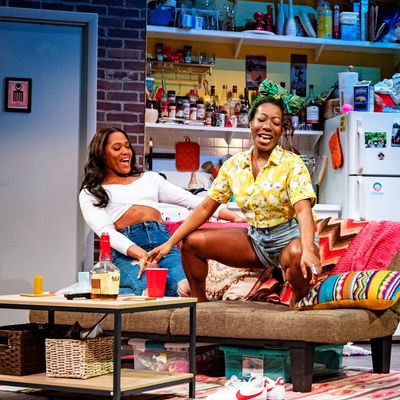
“It’s like, queer … and black as fuck … and magically surreal … and in Brooklyn and, you know? Like, all that.” That’s Octavia, one of the characters in Aziza Barnes’s BLKS, describing the film she’s trying to make with her partner (or maybe just her fuck buddy), Ry. Barnes is an award-winning poet, but her playwriting debut, despite the manic energy of Robert O’Hara’s production, is discouragingly prosaic. It fits every one of Octavia’s descriptors except the one that’s most important when it comes to theater. There’s nothing magically surreal about BLKS, nothing that challenges us to flex different watching and listening muscles than the ones we use in front of our screens. The play is basically a Hulu pilot, and if the story of its central trio of Brooklyn roommates were presented in 23-minute-long punchy, raunchy episodes, it might find its groove. But onstage it feels like a missed opportunity, its drama mundane and its comedy mostly overwrought.
Octavia (Paige Gilbert), a writer, lives with her squad — aspiring comedian Imani (Alfie Fuller) and accounting consultant June (Antoinette Crowe-Legacy, bringing great about-to-explode energy to the not-artsy member of the group) — off the Kosciusko Street J stop, where Bed-Stuy meets Bushwick. They’re all in their early 20s, hungrily hunting for love and sex and success and doing a lot of day drinking while they’re at it. As the play begins, Octavia freaks out upon discovering a genital mole, banishes her swaggery but squeamish lover Ry (Coral Peña) from the apartment when she refuses to examine it, and then sets out on a night of healing debauchery with her roomies. “We are on a mission to Resurrect our Fly,” announces Imani. Adventures good, bad, and ugly — from June’s getting hit in the face by a rapey stranger on a subway platform then getting her high-heel fixed by a Boy Scout–y stranger at the club (both are played by Chris Myers), to Octavia’s getting her panties stolen, to Imani’s bombing at a stand-up club and dancing around a potential hookup with an eager white girl known only as “That Bitch on the Couch” (Marié Botha) — ensue.
And that’s pretty much it. It’s not that the play needs more event — there’s plenty of great theater where “nothing happens” — but it could use more big, irresolvable questions. When BLKS offers ideas, they’re closed off: stances, not investigations. “Seems like all y’all want us to do is twerk and die!” Octavia shouts at the audience after June is attacked. Our presence isn’t acknowledged anywhere else in the production, but in this moment we’re called to account as passersby who failed to take action, engaged only because we’re being chastised. Or take Botha’s whole mess of a character: Nameless and soulless, she’s every cringey well-meaning-white-woman cliché — a wealthy culture tourist who confuses Imani for another black woman and wants to touch her hair and ask her probing, tone-deaf questions. “Nah, I can’t look,” says Imani later in the play when “That Bitch” has popped up in her Venmo payments. “’Cuz if I see her name and deposit that money, she’s like, a real person, not just some dumb shit I did on a Friday.” It’s a jarring moment: The character is acknowledging a kind of complexity that the play as a whole forestalls.
It’s the highly game trio of actors at the center of BLKS that keep us on board. Fuller and Crowe-Legacy feel especially muscular — they’re having palpable fun with the sly, strutting, secretly sensitive Imani and the tightly wound, vulnerable June. Though O’Hara’s instinct is to pitch the play at a shouty, frenetic extreme that winds up overpushing the comedy, Crowe-Legacy and Fuller find their funniest bits in smaller, more human moments. Fuller is a trip to watch as the girls bop around getting dressed for their night out, and there’s a highly enjoyable murderous glint in June’s eye as she stands behind Justin — that Boy Scout from the club who’s somehow become an unexpected houseguest — and experiments with how easy it would be to shatter a handle of Maker’s Mark over his head.
But the sum of the play’s parts never surprises us, never exceeds our expectations for standard-issue contemporary realism. In that sense, BLKS is just one example of a densely populated, depressingly long-lived genre of playwriting — theater that takes no advantage of its own theatrical potential, that seems to have no interest in the unique possibilities of its form. It’s a maddening paradox: There’s plenty of TV that understands that theater has something special about it — call it something magically surreal. Think of the ending of Russian Doll, or of that cheesy perfect harp music that plays in Slings and Arrows whenever someone’s making a breakthrough onstage, or of any show—from Bob’s Burgers to Buffy the Vampire Slayer to Crazy Ex-Girlfriend — that knows the power of a big, ridiculous musical-theater number. So much smart TV actually gets what theater is capable of. Meanwhile, so much theater is simply trying to be TV.
BLKS is at MCC through May 26.


